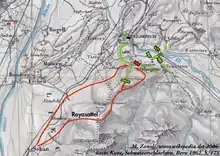Battle of Frastanz
The Battle of Frastanz between an army of the Old Swiss Confederacy and the troops of King Maximilian I of the Holy Roman Empire took place on 20 April 1499. In one of the many raids of the Swabian War, an expedition of Habsburg troops had plundered some villages in the Swiss Confederacy, who responded by sending an army to Vorarlberg. At Frastanz, a few kilometers south-east of Feldkirch, the Habsburg troops had blocked the entry to the Montafon valley with a strong wooden fortification called a Letzi. The Swiss used a flanking maneuver to bypass the Letzi and after a hard battle routed Maximilian's army. Many Landsknechte drowned in the river Ill.
| Battle of Frastanz | |||||||
|---|---|---|---|---|---|---|---|
| Part of the Swabian War | |||||||
 Depiction of the battle from the Luzerner Schilling, 1513. | |||||||
| |||||||
| Belligerents | |||||||
| Old Swiss Confederacy and the Three Leagues of the Grisons | forces of king Maximilian I of the Holy Roman Empire | ||||||
| Commanders and leaders | |||||||
|
Heinrich Wolleb†,[1] Ulrich (IX) von Sax[2] |
Burkhard von Knörringen,[1] Johann von Königsegg[3] | ||||||
| Strength | |||||||
| ca. 9,000 infantry |
ca. 8,000 knights and Landsknechte at Frastanz, | ||||||
| Casualties and losses | |||||||
|
ca. 10 dead; ca. 60 wounded[4] | ca. 2 – 3,000 dead | ||||||
The battle
Because a frontal assault on the strong fortifications at Frastanz seemed futile, the commander of the Swiss troops, Heinrich Wolleb from Uri, devised an alternate battle plan. Some 2,000 men were to cross the Roya mountain, clear it from Tyrolean troops, and then attack the main camp of the Habsburg army from the side. Another 5,000 men under the command of Count Ulrich von Sax were to advance at the foot of the mountain and then meet the first group, also attacking from the mountain above and behind the Letzi. Some 1,600 men from the Grisons would stay put to keep the garrison at Feldkirch at bay.

Wolleb's troop was quickly engaged by the Tyrolean soldiers, but managed to drive them down the mountain. At a place called Fellengatter, they met again with the other part of the Swiss army. The Habsburg troops, amongst them many Landsknechte of the Swabian League, attacked them, but when the Swiss charged from their higher ground, the Swabian battle line collapsed. Accounts vary; some claim the fight was long and hard, others mention that the Swiss overran the Landsknechte.[5][6] Heinrich Wolleb fell by a gun bullet.[7] The Swiss ultimately drove the Habsburg soldiers back. On their flight, many drowned in the river Ill, which ran high due to the snowmelt in spring.
The Swiss camped three days at the battlefield and plundered and burned the villages in the area.[8]
References
- Schibler, T.: Battle of Frastanz in German, French and Italian in the online Historical Dictionary of Switzerland, 2005-03-31.
- Klöppel, H.: Burg und Herrschaft Frischenberg Archived September 29, 2007, at the Wayback Machine. In German. URL last accessed 2006-09-17.
- N.N.: Short summary of the battle Archived July 6, 2011, at the Wayback Machine. In German. URL last accessed 2006-09-17.
- State Archive of Liechtenstein: Liechtensteinisches Urkundenbuch; Regesten: 1499 Archived September 28, 2007, at the Wayback Machine. URL last accessed 2009-09-17.
- Forum 1499: Wie die Schwäbschen gan Frastitz in die Letze zugend, und die Eitgnossen das vernamend, schnell dahin zugend und die gewunend und ein grosse schlacht tatend. In German. URL last accessed 2006-09-17.
- N.N.: Frastanz im Mittelalter Archived March 13, 2007, at the Wayback Machine. In German. URL last accessed 2006-09-17.
- Morard, N.: Die Eidgenossen auf der europäischen Bühne, here p. 323; in Schwabe & Co. (ed.): Geschichte der Schweiz und der Schweizer; Schwabe & Co 1986/2004; ISBN 3-7965-2067-7.
- Stüssi-Lauterburg, J.: Der Schwabenkrieg 1499 Archived 2007-06-29 at the Wayback Machine, 1999. (PDF file, 37kB.) In German. URL last accessed 2006-09-17.